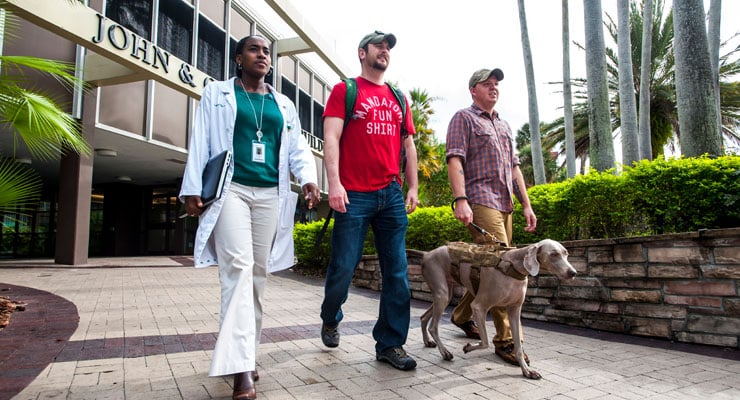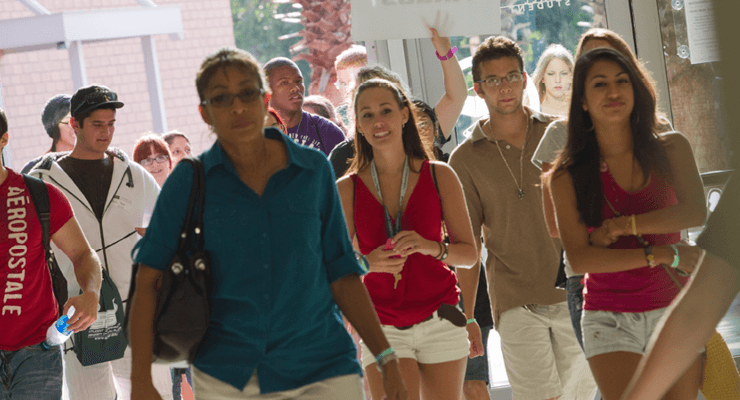Veterans and College Admission FAQs
By Joe Emerson | Last Updated: Mar 5, 2025

Military training and experience position veterans for college. Federal legislation helps make college possible for veterans. And colleges strive to enroll veterans and help them succeed. The facts behind those statements answer many of the FAQs on veterans and college admission.
How Does Military Training Position Veterans for College, Careers?
For most civilian jobs/careers, there is a military equivalent. The training for those military jobs sometimes translates to college credits, and the American Council on Education is one facilitator of that translation.
ACE helps veterans and the colleges that serve them. Most significantly, ACE provides quality assurance and policy guidance on the Joint Services Transcript. A veteran’s JST details military experience and training and guides schools on how to turn that experience and training into college credits. Community College of the Air Force Transcripts are another option to consider.
MilitaryBenefits.Info notes that many colleges grant credits for military training and experience, but “the amount of credit received can often fall below expectations.” ACE also notes that:
- Most ACE credits apply to lower-level courses such as associate degree classes.
- Few ACE credits translate to upper-level college coursework.
- Colleges don’t always follow ACE recommendations.
- Colleges have the final say on granting credits for military training and experience.
How Has Washington Helped Make College an Option for Veterans?
The GI Bill was one of the benefits of being a veteran of World War II. Its key accomplishments were underwriting education and enabling homeownership for veterans. Initially known as the Servicemen’s Readjustment Act of 1944, the GI Bill, or GI Bill of Rights, has been lauded by some as one of federal legislators’ most significant accomplishments.
The U.S. Department of Veterans Affairs says that “(b)efore the war, college and homeownership were, for the most part, unreachable dreams for the average American. Thanks to the GI Bill, millions who would have flooded the job market instead opted for education. In the peak year of 1947,(v)eterans accounted for 49 percent of college admissions. By the time the original GI Bill ended on July 25, 1956, 7.8 million of 16 million World War II Veterans had participated in an education or training program.”
Evolution of the GI Bill of Rights
The evolution of the GI Bill included an update in 1984, when it morphed into the Montgomery GI Bill. The Montgomery GI Bill has two main versions. One benefits those who enrolled in the program while serving and met a minimum service requirement, and the other helps active Reservists.
Legislators acted again in 2008, passing the Post-9/11 Veterans Educational Assistance Act, enhancing education benefits for people serving after Sept. 10, 2001. Those using the Post-9/11 GI Bill to attend college can apply for financial assistance with housing, books and supplies, and a rural relocation payment. Full tuition is paid for in-state public college students, but private or foreign school tuition funding is capped. There are even scenarios where unused benefits can transfer to a spouse or dependents.
Both the Montgomery Bill and Post 9/11 Bill provide education benefits, but there are differences between the two programs. There are other options available to veterans seeking financial assistance for education. Veterans who qualify for more than one program can choose which best fits their needs.
How Do Colleges Position Veterans for Success?
School policies and participation in nongovernment programs for veterans at colleges depend on the school. A look at how USF treats veterans is a good tutorial on what’s available, considering USF’s status as one of the nation’s most veteran-friendly campuses. It was ranked No. 1 among four-year schools in 2017.
The USF clearinghouse for veterans services is the Office of Veteran Success. It can help with and through:
- Admissions: The Pathway to Admissions Program guides veterans through the process.
- Benefits: OVS maps the benefits application process for veterans.
- VetSuccess on Campus: This trailblazing partnership of USF and the VA provides career counseling, mentoring, employment assistance, and guidance on VA benefits and health services.
- Events: Special graduation ceremonies and baseball games, family barbecues, and a Veterans Outreach Expo are among activities OVS arranges to recognize and support veterans on campus, from employees to students.
- Services: The list includes help through counseling, tutoring, scholarships and awards, career mentoring, VA work-study, and special programs such as the VCARE Nursing Program and Veterans Success Class. The class is designed to help with academics and prep vets for employment.
- Support systems: These include the Got Your Six Veterans Success Network, the Student Veterans Network, and the Society of American Military Engineers.
At USF, another well-earned perk for military service is a waiver of out-of-state tuition rates and fees for qualifying veterans.

There Are Lots of Questions Unique to the Veterans Enrollment Process
Do you think navigating the college application process is challenging? Try doing it while attempting to maximize your access to VA benefits. Here are five frequently asked questions involving the enrollment process:
Question) Do VA benefits cover the expense of remedial courses if needed?
Answer) Yes, if a placement test indicates a course is needed for you to advance in your major, most VA benefit programs will cover the cost.
Question) How long does it take to get the money from the VA?
Answer) The first installment can take several months, so the benefits process should be initiated as soon as possible. Subsequent payments typically take about six weeks.
Question) How much of my tuition will the VA underwrite?
Answer) The VA’s eBenefits page can help you calculate how many months of school your program will cover.
Question) Will failing a class mean I have to repay my VA benefits?
Answer) No, you don’t have to repay the cost of a class if you fail, but you will have to repay the VA if you drop a class after the deadline for withdrawing.
Question) What information do I need to apply for admission to a college?
Answer) Along with what the school stipulates for most students, you will need a copy of your military transcript.
Question) Do the admission standards and rules that apply to other applicants apply to me?
Answer) Yes, and a school admissions counselor is the best source for details on the process, including things unique to veterans.
If your search for answers to benefits questions bogs down, efforts such as the Warrior-Scholar Project and Service to School can help you get through the school selection and application process efficiently and effectively.
If you have a school in mind, turn to the admissions office to get questions answered and identify on-campus services for veterans. The USF Office of Admissions is ready to engage with veterans on the benefits of becoming a Bull. Contact us online, or reach us by phone at 813-974-3350.



